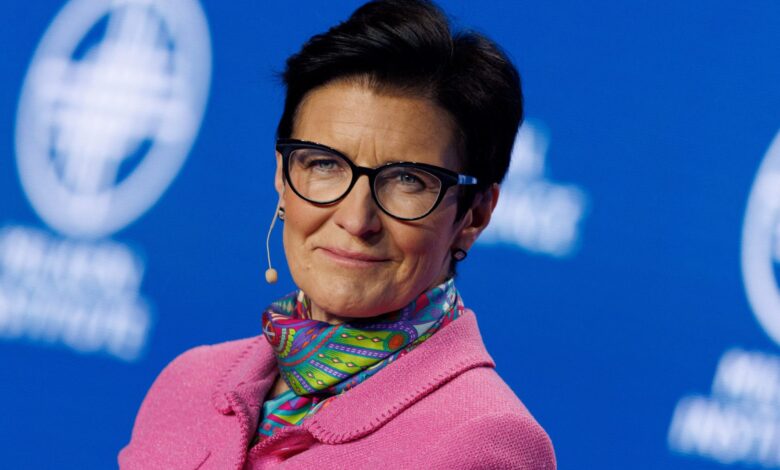Citigroup CEO Jane Fraser has chance to pull off the restructure of the century, bring banking empire back to its former glory

It seems almost unfathomable that there was time — and not that long ago — that Citigroup was the model financial services firm.
It might be yet again — but only if its CEO Jane Fraser can pull off the restructuring of the century.
Full disclosure: I’m not a believer in the Citi comeback story, though there are people I respect on Wall Street (Wells Fargo analyst Mike Mayo among them) who give it a decent shot.
My skepticism is grounded in the fact that I have covered the place for decades and — like the bank’s long-suffering investors — have seen its institutional rot firsthand.
Citigroup’s current sad state of affairs — a lagging stock price, layers of (mis)management, endless failed restructurings and inability to crack the top tier of major business categories — didn’t occur overnight and will take some doing to fix.
The so-called financial supermarket was created back in 1998 by merger impresario Sandy Weill and his sidekick, a brilliant and then-youngish executive named Jamie Dimon, when they joined their Travelers Group brokerage and insurance business with John Reed’s Citicorp commercial-banking empire.
It was supposed to be a banking innovation for the ages.
For a short time it was, then things went sideways.
Weill got Reed bounced to take sole control of the new company.
Dimon’s ego began to match Weill’s.
They hated on each other so much that Dimon was defenestrated first to the hinterlands of regional banking before he pulled up as the CEO of a then-underperforming JPMorgan Chase.
Weill was a brilliant dealmaker.
He wasn’t much of a manager.
He faced significant legal issues because financial supermarkets that cross-sell products to consumers and institutions are regulatory headaches.
Plus, most of the smart managers left with Dimon; those who remained found themselves mired in scandal and unable to manage risk as the banking crisis rolled around.
Most people think of the 2008 financial crisis as a Lehman Brothers-inspired moment.
But nowhere was the risk-taking more reckless than at Citigroup.
Were it not for the government bailout and massive Fed money printing, Citi would have collapsed leaving US taxpayers on the hook for its $2 trillion in assets, customer deposits and a lot more.
That Citi survived (only after successive bailouts) demonstrates the true incompetence of its management under a man named Charles “Chuck” Prince, Weill’s favored successor.
Subsequent CEOs weren’t much better at turning around the near zombie bank.
Next came Fraser, the first woman CEO of a major bank.
She’s supposed to be smart and hardworking, having spent years in Citi’s massive and sprawling infrastructure, so she knows where the bodies are buried.
Yet since being named CEO, she waited three years before doing what should have been done back in 2008 — cut this garbage heap down to size.
Fraser is now slashing staffing and management layers, and slimming down its global footprint.
Citi will be focusing more on its profitable private bank, its so-called trade and treasury solutions for large corporate customers, credit cards and its commercial bank.
She bolstered her senior staff with some smart people like former Merrill Lynch brokerage chief Andy Sieg, a key architect in the downsizing who is now head of wealth management; and JPMorgan star banker Vis Raghavan, the new head of Citi’s banking unit.
So why am I skeptical?
Again, I’ve seen this rodeo before.
So have investors, and so has Fraser’s board.
With anything less than a decent-sized turnaround in the coming year, Fraser could be next out the door.
Nikki’s money men
Nikki Haley’s concession speech last Wednesday did little to unify the GOP behind Donald Trump in November — and that goes for her big-money supporters, too.
Haley, of course, was able to stay in the race as long as she did because of the backing of a coterie of very rich finance titans who can’t stand you-know-who.
Haley dropped out of the race after her Super Tuesday losses because the money men said it was time.
Are they now running to Trump?
Not yet and maybe never, and it goes beyond Haley’s non-endorsement.
They still think Trump will be a horrible and chaotic president in round two (his crazed Jan. 6 speech preceding the Capitol riots still rings in their ears).
His presidency was successful but only at implementing core GOP policies, they tell me.
His biggest problems, beyond his crazy temperament: Trump failed to lead during COVID, and he spent like mad.
But they aren’t sitting out 2024 altogether because much is at stake.
Trump is bad, but Joe Biden has been a horrible president on so many levels it’s hard to list them all, they say.
Both he and Trump need to be checked by GOP lawmakers, which is why they’re shifting their focus to House and Senate races, GOP donors and advisers tell me.
The donor class sees the Senate as eminently winnable for the GOP; holding on to the House is also a real possibility given the unpopularity of core Biden and Democratic policies, i.e., the border chaos and spending that has led to lingering inflation.
Trump may beat Biden in November or maybe not.
If the GOP wins both chambers, it won’t matter much either way, is what I hear.




